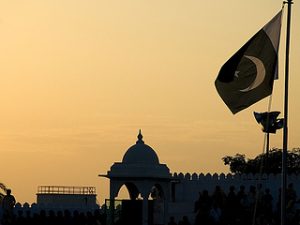In a major speech on March 18 with potentially far-reaching consequences for South Asian security, Pakistan Army chief Gen. Qamar Javed Bajwa said that “it is time to bury the past and move forward” when it comes to his country’s relations with neighbor and arch-rival India. Speaking at the Islamabad Security Dialogue, he outlined a vision for his country’s foreign and strategic policy that was refreshingly forward-looking, building on themes that have been trickling in from Islamabad over the past few months: that Pakistan would reprioritize economics, and situate it at the heart of its foreign policy; that peace with India is a pre-condition for this geoeconomic pivot; and that Pakistan recognizes the need for collective action to meet transnational threats in the post-COVID-19 era.
“National security in the age of globalization, information, and connectivity has now become an all-encompassing notion; wherein, besides various elements of national power, global and regional environment also play a profound role,” Bajwa said. Noting that national security is “multi-layered,” shaped by a mix of external and internal variables, he added, “I also firmly believe that no single nation in isolation, can perceive and further its quest for security, as every single issue and security dilemma faced by today’s world is intimately linked with global and regional dynamics.”
The Islamabad Security Dialogue is being organized by the Pakistan government’s National Security Division and its advisory board. Inaugurating the dialogue on March 17, Prime Minister Imran Khan had also brought up themes reiterated by Bajwa. “National security is also about non-traditional issues like climate change and food security which threaten Pakistan and its overall security,” Khan had said.
Noting that Pakistan’s perennial dispute with India has come in the way of the country realizing its full geoeconomic potential in terms of leveraging its geographical location at the intersection of South and Central Asia, Bajwa claimed that the “Kashmir dispute is obviously at the head of this problem.” “It is important to understand that without the resolution of Kashmir dispute through peaceful means, process of sub-continental rapprochement will always remain susceptible to derailment due to politically motivated bellicosity.”
In his speech, Bajwa described his country’s geoeconomic shift in terms of four “core pillars”: peace (including inside the country); non-interference in the affairs of other states; trade and connectivity within the region; and “sustainable development and prosperity through establishment of investment and economic hubs within the region.”
Early last month – in a hint that sections of the Pakistani establishment were rethinking its India policy – Bajwa had noted that Pakistan wished to “extend the hand of peace in all directions.” On February 25, India and Pakistan had issued a joint statement recommitting themselves to the informal 2003 ceasefire agreement. Reporting on the development, the Indian press noted that the joint statement was the result of considerable back channel talks between the two countries, conjecturally involving Indian National Security Advisor Ajit Doval and Khan’s Special Assistant on National Security Division and Strategic Policy Planning Moeed Yusuf.
Interestingly, as an Indian Express article on Bajwa’s March 18 speech has already noted, the absence of any explicit demand from the Pakistan army chief that India restores the statehood of Jammu and Kashmir (which, in any event, is also something the Modi government has committed to on record) or the restoration of the now federally controlled territory’s autonomous status through Article 370 of the Indian constitution suggests a considerable softening of Pakistan’s stance on the matter. The newspaper also accurately assessed Bajwa’s omission of Pakistan’s traditional position that the Kashmir dispute be resolved in line with old United Nations Security Council resolution as a significant shift.
However, experts remain cautious about Bajwa’s statements, noting that they will have to matched with actions, especially when it comes to Pakistan’s support for cross-border terrorism in Afghanistan as well as India. Others note that even a single terrorist attack on Indian soil that New Delhi adjudicates to have emanated from Pakistan could shatter the fragile peace now in the making. To be sure, such an attack would be viewed by the hawkish Modi government as further evidence of Pakistan’s perfidy or duplicity.
But it also needs to be kept in mind (as I argued in a 2016 research paper), that Pakistan exhibits many hallmarks of a non-unitary state, where sections of the security establishment have worked at cross purposes in the past. It may very well be that despite Bajwa’s commitments (assuming they are sincere), others in Pakistan may seek to muddy waters when it comes to India based on their own incentives.













